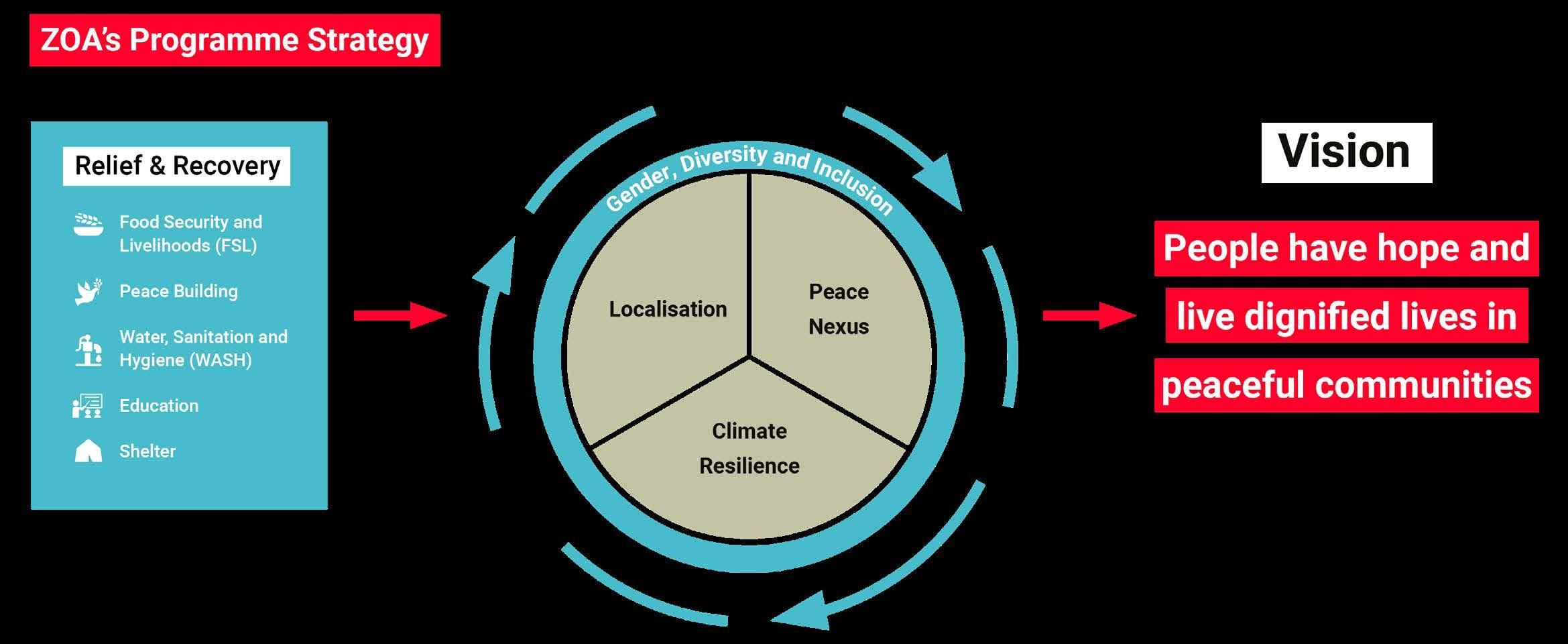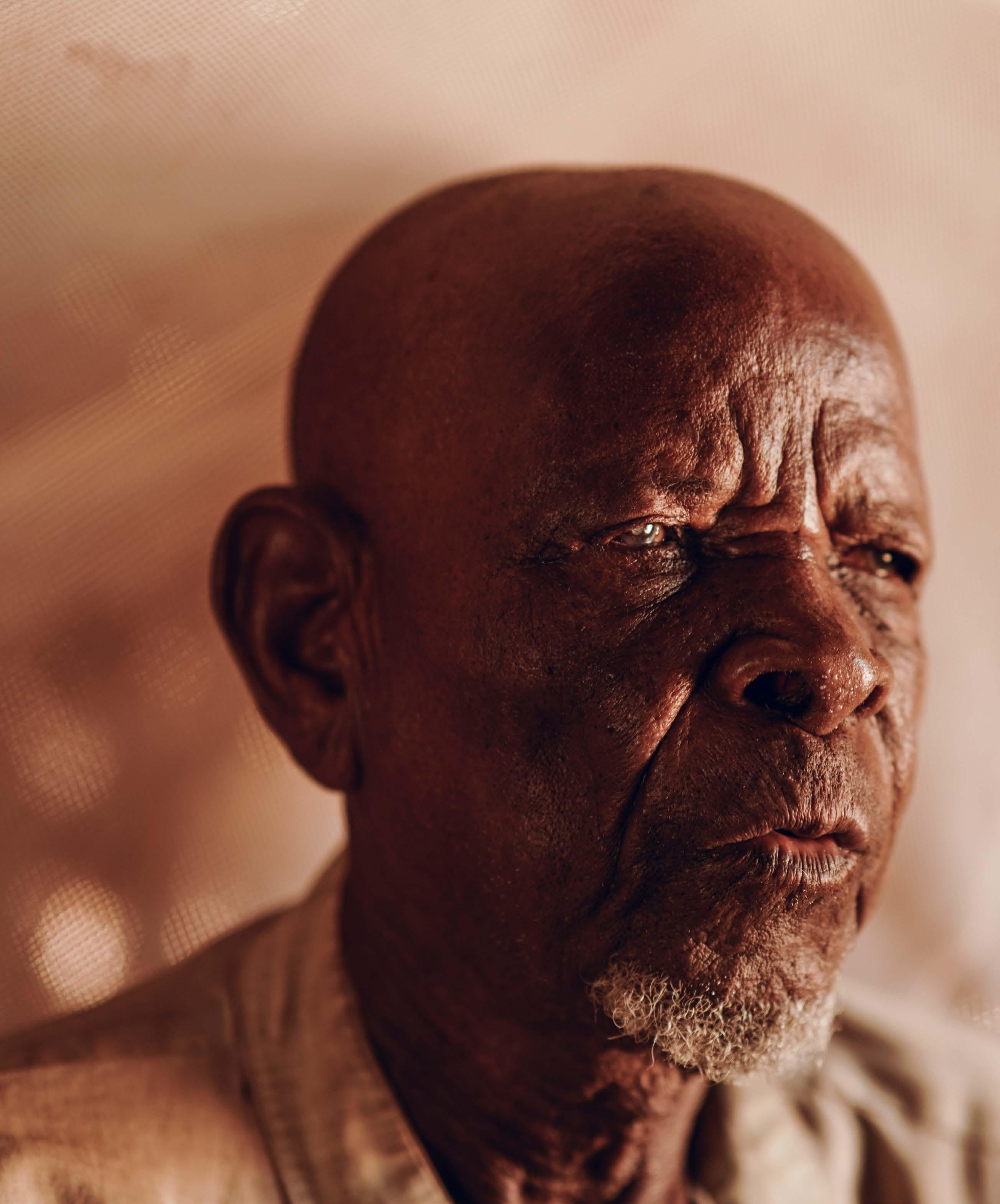
5 minute read
ZOA’s approach and strategy
from Annual Report 2022
by ZOA
ZOA stands with people affected by violent conflict or natural disasters. We contribute to relief and recovery. We strive to be in areas where our added value is greatest, and we seek to reach out to the most vulnerable. We help people rebuild their livelihoods and become more resilient in these fragile contexts. While ZOA’s goals remain the same – to be present where we are most needed and to help those most in need – we continually strive to improve our collective effectiveness. We are pleased to share ZOA’s approach, strategy, and how we monitor and evaluate our global progress and results.
From relief
Advertisement
When natural disasters or violent conflicts strike a country, ZOA responds to people’s immediate needs with the provision of cash, food, clean water, non-food items, and shelter. We do this in close coordination with national governments and our local partners. Many of the countries in which ZOA operates have a long history of chronic and recurring crises. With this in mind, in addition to meeting immediate needs, ZOA focuses on creating and implementing sustainable recovery projects.
To recovery
ZOA’s core expertise lies in the implementation of early recovery projects in conflict-affected areas and fragile settings. ZOA responds to identified needs regardless of nationality, race, gender, religious beliefs, class, or political opinions. Within (early) recovery projects, ZOA has a hybrid model of selfimplementation and collaboration with local partners. We also aim to strengthen the capacities of our partners.
In fragile contexts
‘Conflict-related fragility’ is an essential characteristic of the context in which ZOA chooses to operate. While the underlying causes of conflict are often related to access to livelihood assets – such as land and water – the conflict itself disrupts people’s livelihood strategies as well, creating different forms of fragility.
Crisis-affected people
The vast majority of people fleeing from violence or (natural) disaster does not cross an international border to seek refuge in a neighbouring country, but is displaced within their home country. ZOA focuses on providing support in the afflicted region – in the country itself – and beyond its borders when needed.
Needs-based interventions
ZOA’s interventions are based on needs identified within the communities. ZOA helps those identified as the most vulnerable. This often includes women, children, femaleheaded households, the elderly, people with disabilities, minorities, refugees, and internally displaced people (IDPs) in need of protection. If local needs go beyond ZOA’s expertise, we encourage other organisations to respond.
Sectoral choices
As we work towards building peaceful communities where people can lead dignified lives, ZOA focuses on providing support in five sectors: Food Security and Livelihoods, WASH, Peacebuilding (including Land Rights), Education, and Shelter.
Launch Strategic Plan 2023-2026
In 2022, ZOA developed a new Strategic Plan for 2023-2026. As part of this process, we evaluated the goals set forth in our previous plan. ‘Putting people at the centre’ was an important focus in our 2019-2022 strategy. During the strategy period, ZOA fully implemented the Core Humanitarian Standard (CHS) and was externally certified. Moreover, a major review and upgrade of ZOA’s Integrity Framework was realised, resulting in better options for programme participants, staff, and other stakeholders to freely share feedback and communicate complaints.
‘Further improvement of the quality of programming’ was another strategic plan priority. In the past few years, significant steps were taken to revise ZOA’s standard way of working, develop a project management information system, and strengthen internal accountability by intensifying internal auditing of country programmes. In line with the strategic focus of ‘developing innovation support,’ an important contribution was made with the application of digital platforms for Cash and Voucher Assistance (CVA) and further development of CVA approaches.
Development of ZOA Strategy 2023-2026
In 2022, we created our new strategy: ‘Towards Peace and Resilience.’ The new strategy is informed by global developments such as climate change and a growing number of violent conflicts. We defined our priorities for the coming years in an interactive process involving ZOA staff worldwide and other stakeholders. ZOA has decided to bring more focus to its programmes along the lines of three interrelated programmatic themes: Peace Nexus, Climate Resilience, and Localisation. Gender, Diversity, and Inclusion (GDI) will receive additional attention. Gender inequalities and marginalization of specific groups often contribute to – or are intensified by – conflict. The effects of climate change often disproportionally impact women and marginalized groups. An inclusive approach is of crucial importance.
Strategic priorities
Peace Nexus
In all our relief and recovery work, we search for ways to reduce conflict and promote peace. We work in highly complex and conflict-affected contexts, where our presence and interventions could easily do harm. We integrate conflict sensitivity with all our work, and we include protection principles in all our projects.
We will view and approach all our sectoral interventions through a peacebuilding lens. Peace is not the absence of active violence (‘negative peace’); it entails social cohesion, mutual acceptance, gender equality, and opportunities for socioeconomic development (‘positive peace’).
Climate Resilience
We will help communities adapt and become more resilient to the impacts of climate change and environmental crises. At the same time, in accordance with our core value of ‘good stewardship,’ ZOA will review its own operations to limit our environmental footprint as an organisation.
Localisation
We aim to work towards stronger local capacities, leadership, and ownership. We contribute to a strong civil society – one that is able to voice its needs and priorities. Therefore, we constantly seek options to cooperate with local actors and stakeholders – such as community-based organisations and local governments –and involve them in decision-making at all stages of programming. Where needed, we will continue to make use of ZOA’s local presence and capacity for the implementation of projects.
How does ZOA measure results?
In May 2022, ZOA released the new MEAL framework with the goal of having a more standardized and harmonized approach to Monitoring, Evaluation, Accountability, and Learning. The framework includes detailed roadmaps that guide the implementation of MEAL activities, such as project evaluations, data collection and analysis, and practices to enhance accountability. Harmonization of MEAL activities across ZOA’s programme countries will make it far easier to gain insight into ZOA’s impact as an organisation and more specifically into the progress made toward achieving our strategic objectives. The newly developed exchange platform enables ZOA to discuss common MEAL challenges and share experiences and practical tools that have been developed. ZOA will continue to implement and expand the MEAL framework – especially in learning as well as quantitative and qualitative data analysis – in 2023 and beyond.
New MEAL framework in Myanmar
In 2022, ZOA began to implement the new MEAL framework in Myanmar. Historically, officers were assigned to specific projects and reported to project or programme managers. Under the new MEAL structure, a more independent unit is now in place. This effectively facilitates the quality control of MEAL practice within ZOA. To date, the new Myanmar MEAL unit has primarily worked with the Monitoring Framework Roadmap, which has allowed the unit to measure and track project performance indicators in a more structured manner. Additionally, use of the Accountability Roadmap has led to a more harmonised way of involving and informing project participants.
Escape from Boko Haram
“When Boko Haram attacked our village, I first tried to run by myself,” says Shettima (80) from Nigeria. Shettima lost his eyesight ten years ago. “But couldn’t see which way to go.” He waited for someone to grab his arm and take him to safety. In the background, he heard gunshots and screaming.

Shettima is grateful that he managed to escape. He has lived in a hut in Gongulong refugee camp ever since. “My brother took care of me here,” says Shettima. “Unfortunately, he passed away.”
Thanks to ZOA’s cash assistance, Shettima was able to buy food and clean water to drink. He is very grateful for that. “I have no one to take me to a busy spot to beg. All I can do here is wait in my hut for people to bring me food.”










